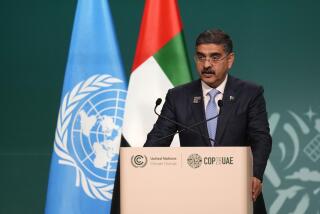Explosion Kills 8 in Pakistani Border Town; U.S. Blamed
- Share via
MIRAN SHAH, Pakistan — An explosion at a Pakistani house near Afghanistan killed eight people and wounded nine Saturday, witnesses said. Tribal elders claimed U.S. helicopters had attacked, but the American military denied operating in the area.
Pakistan’s army declined to comment on the blast at a Muslim cleric’s home in North Waziristan’s remote Saidgi village, about 3 miles from the Afghan border, an area where Al Qaeda and Taliban militants are believed to be active.
About 20,000 U.S. troops are in Afghanistan. But neighboring Pakistan says they aren’t allowed to operate on its side of the rugged, sometimes poorly defined border.
Residents said the explosion came before dawn Saturday at the home of cleric Maulana Noor Mohammed.
The cleric was not at home. The eight dead and nine wounded included women and children, tribal leader Momin Khan said. Pakistani intelligence and security officials, who declined to be named in line with policy, confirmed the death toll.
Khan said he and other tribal elders complained to the area’s top commander, Maj. Gen. Akram Sahi, that U.S. helicopters launched the attack, landed and took away five tribesmen, then flew toward Afghanistan.
He said Sahi had assured the elders that Pakistan’s military was investigating.
In Afghanistan, U.S. military spokesman Lt. Mike Cody said he had no reports of American aircraft bombing targets near the border Saturday.
Last month, a senior Al Qaeda suspect from Egypt, Abu Hamza Rabia, was killed in the area. Pakistan denied residents’ claims that he died in a U.S. missile strike, although metal fragments found at the site appeared to be from an American Hellfire missile, which is carried on the remote-controlled Predator drone.
A senior Pakistani security official, who requested anonymity because he wasn’t authorized to comment on the Saidgi explosion, said Pakistan’s army had no role in it.
One of those hurt in the blast, 30-year-old Mohammed Shafiq, said he’d been sleeping and was awakened by the sound of helicopters, then gunfire.
“For moments I could not decide what I should do, but when some weapon hit the home and walls started falling, I ran out,” he said from a hospital bed in North Waziristan’s main town, Miran Shah.
Shafiq, his arms and legs bandaged, said he didn’t know what caused the explosion.
More to Read
Sign up for Essential California
The most important California stories and recommendations in your inbox every morning.
You may occasionally receive promotional content from the Los Angeles Times.










